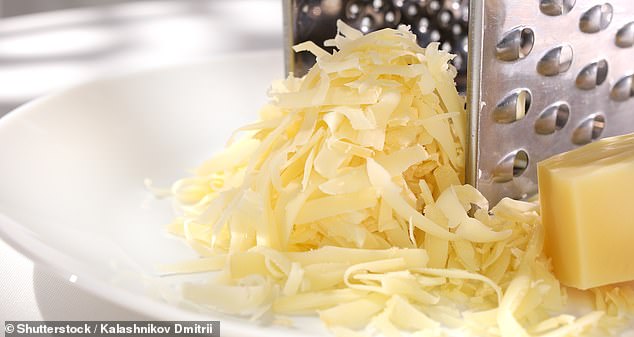A small but growing group of health experts is urging people to wash grated cheese to remove potentially harmful additives.
Videos showing a cloudy yellow residue left over from the process have racked up hundreds of thousands of views on social media, with users claiming the “kitchen hack” is essential for removing preservatives and other unwanted substances.
In one videoUser Amaya Stowers is shown rinsing and draining a handful of grated cheese because “there are wood chips in there.”
In another article, a creator named Shay Click melted washed and unwashed cheese on two tortillas and compared how they melted. The tortilla with the rinsed cheese looked much more melted. “That’s why I wash the cheese,” Click said.
Some health experts have suggested washing grated cheese before eating it to remove additives.


Holistic physician Dr. Paul Saladino was shown rinsing a handful of cheese and holding a pot of cloudy water left over from the process.
Texas weight loss expert Dr. Lori Shemek responded to a video warning: “Here’s why you should wash shredded cheese.”
While some experts recommend rinsing cheese to remove additives, others say it is an unnecessary step and the risk from these ingredients is minimal.
Pre-shredded cheeses often contain anti-caking agents, which are substances intended to prevent individual strands of cheese from solidifying in the package.
The main one is powdered cellulose, which is also found naturally in various fruits, vegetables and whole grains.
The additive has been the subject of controversy in recent years as it is typically derived from sawdust or cotton fiber and added to processed foods.
However, “nobody cuts up logs and throws them into cheese,” said Dr. Abbey Thiel, a food scientist and project manager at Wageningen University and Research in the Netherlands. Health.
Although the additive comes from sawdust, the FDA has given it the designation of “generally recognized as safe” (GRAS), meaning there is no evidence that it causes harm.
A TikTok user who goes by the name foodsciencebabe, who claims to be a chemical engineer in Minnesota, said in a January article video “We know that (cellulose) is safe and, in fact, even beneficial, because we understand what it does in the human body.”
She explains that cellulose is a source of insoluble fiber, which adds bulk to stool and helps food pass more easily through the stomach and intestines.
“Just because a food ingredient is also used in non-food applications doesn’t mean it’s unsafe to consume,” he said. “It’s not something we should be afraid of.”
Jen Messer, a registered dietitian and president of the New Hampshire Academy of Nutrition and Dietetics, said TODAY that humans lack the enzymes necessary to break down cellulose, so it passes through the digestive system without being absorbed.

In a TikTok video, user Amaya Stowers is shown rinsing and draining a handful of shredded cheese because “there are wood chips in there.”


TikToker Shay Click showed off melting pre-shredded cheese that had either been washed or unwashed to see which would melt first.
In the video Dr. Shemek responded to, holistic physician Dr. Paul Saladino was shown rinsing a handful of cheese and holding a pot of cloudy water left over from the process.
Dr. Saladino mentioned natamycin, a preservative that prevents mold and prolongs the product’s shelf life. “We don’t really know what effects it will have on the human gut,” he said.
The additive has made headlines in the past for being banned from Whole Foods and placed on its “Unacceptable Food Ingredients” list.
However, both the FDA and the World Health Organization define the additive as “generally recognized as safe,” and the watchdog group Environmental Working Group (EWG) “has not identified any problems related to natamycin in foods.”
Potato and corn starches are also sometimes added to grated cheese to prevent it from clumping. While these can cause gas and bloating, these effects usually only occur in people who consume large amounts.
“Claiming that grating your own cheese is healthier and that pre-grated cheese carries additional risks is simply incorrect and increases unnecessary food fears,” foodsciencebabe said in her video.
While washing cheese may not be necessary, the FDA recommends rinsing fruits and vegetables to remove dirt and bacteria. Additionally, washing rice can make the texture fluffier and remove excess starch.

